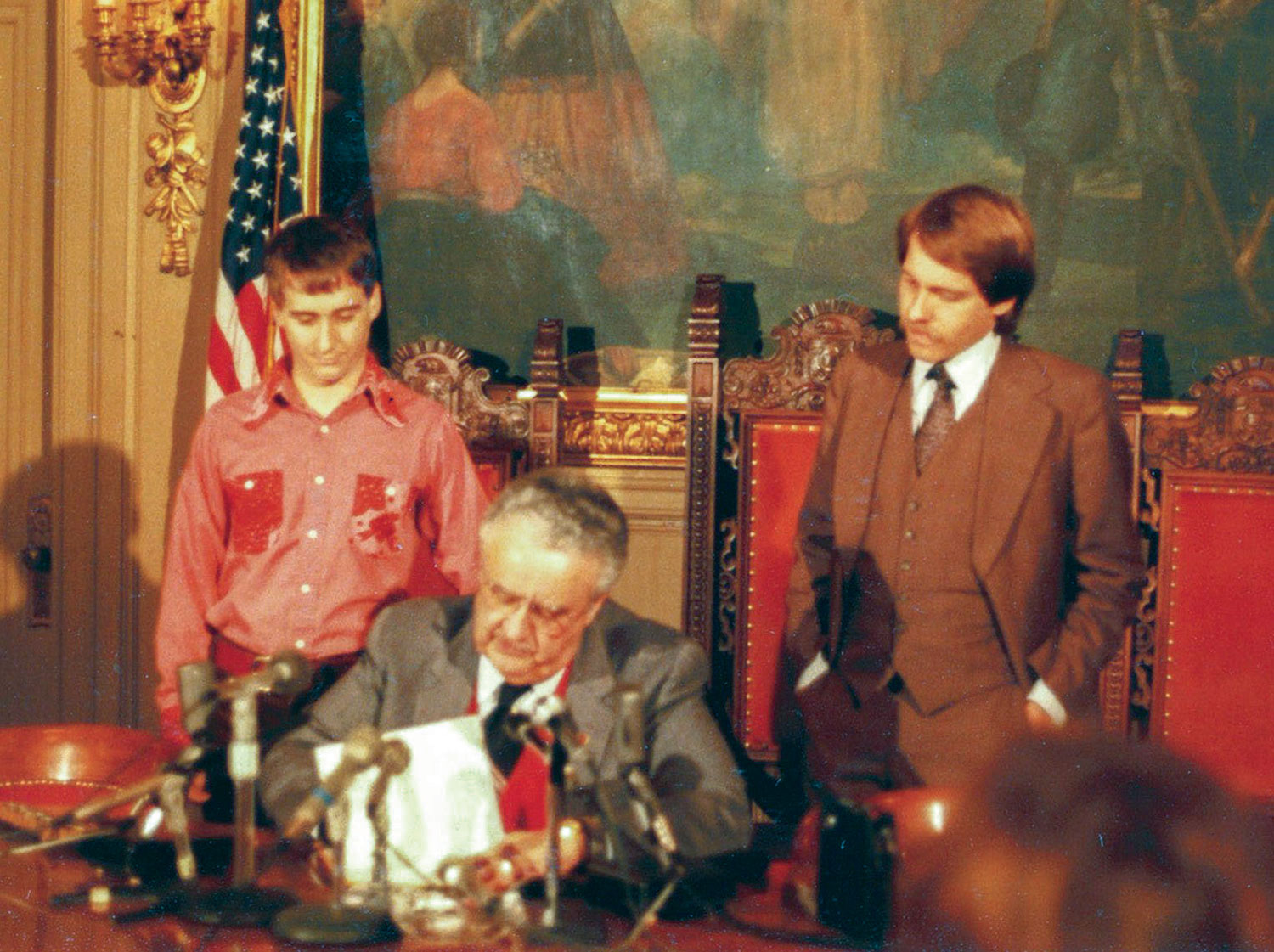As Wisconsin celebrates Pride month this summer, imagine a Wisconsin where LGBTQ people only knew shame. Imagine a lifetime of negative, hostile, dehumanizing messages that told you that you were broken, sick, deviant, criminal, immoral, sinful and (worst of all) all alone in the world. Imagine an infrastructure of schools, churches, police, media and government systems committed to protecting and preserving conformity—while punishing anyone who dared live outside the rules.
Today, we are free to live proud, out, bold, unapologetic lives. But that’s not how things worked in the other Wisconsin.
If you were suspected of being “queer,” even without cause or evidence, you could expect no mercy:
• You could legally be denied service by any business, at any time, as business owners could lose their licenses for allowing homosexuals to congregate.
• You could be denied alcohol, as the state law prohibited homosexuals from being served, and taverns went to great extremes to prevent homosexual mingling. Two men, who did not know each other, could not sit on adjacent barstools, nor turn to face each other, nor purchase drinks for each other, without the bartender alerting the police.
• You could take the extreme risks of visiting a gay bar, which included being seen (and blackmailed), harassed by hecklers, arrested in raids, or rolled by hustlers.
• You could be the victim of a “poison pen” letter, where someone with knowledge of your secret life threatened to out you, unless you paid them substantial sums of money; some blackmailers didn’t give you the chance: they simply outed you to friends, family, employers, police—effectively ending your life as you knew it.
• You could be fired from your job, with unemployment and references denied, even if you had a perfect performance record for decades.
• You could be evicted from your apartment, with security deposit and references withheld.
• You could be denied apartment rental, and many landlords made it very clear upfront that queers were not welcome.
• Once you found housing, usually in a less-desirable but no less expensive neighborhood, you might be subjected to police “sweeps” designed to harass and intimidate known homosexuals.
• Your private home or hotel room could be invaded at any time, with or without warrant, if you were suspected of having homosexual relations, and you and your sexual partners arrested.
• You could be denied a bank account, credit card, or loan from any financial institution, no matter how impressive your financial portfolio.
• You could be dishonorably discharged from the military, lose all military benefits, and forever live with the burden of your discharge status.
• You could be subjected to “three article” inspections on city streets, and suspected cross-dressers would suffer illegal search, seizure, and sexual assault.
• You could be harassed, arrested, and/or beaten by police in public places, for no crime other than “seeming” queer or being in a known queer space. Upon arrest, your name would appear in local newspapers, as well as your age, address, and employer, inviting more of the harms already listed above.
• You could be forced, as a condition of arrest, to undergo psychiatric examination and/or hospitalization, designed to “cure” you of your disease. For a brief time in Wisconsin, anyone—with or without evidence—could declare you a sexual psychopath, which compelled local authorities to arrest, detain, and institutionalize you until you were considered “healed” by a psychiatric professional.
• If you couldn’t be “healed,” or refused to be “healed,” you might face more permanent punishment for your condition—including forced sterilization, which destroyed the lives of 645 inmates between 1913 and 1978.
• Your name would be listed on an FBI watch list, as well as the names of your family and close friends, and the US Postal Service would monitor your mail for “irregularities.” Your mail could be intercepted, opened, and/or refused delivery.
• Although family rejection was sadly the norm and not the exception, you could be legally forbidden from seeing your own children or parents, based on the social shame and harm you’d caused them by being “queer.”
• You could even be denied a passport or driver’s license.
We’re not talking about 100 years ago. We’re not talking about an alternate reality or a dystopian nightmare—this was life in Wisconsin before 1982. And it was all 100% legal.
Many, many lives were destroyed beyond repair—leading to endemic substance abuse, self-harm, and suicide. It is nothing less than a miracle that any LGBTQ elders survived a life this hard, and that they rose above this ugliness to live their truth.
Thanks to the relentless efforts of right-minded activists, we don’t live in that Wisconsin anymore.
Wisconsin: Forward, never straight
Forty years ago, Wisconsin became the first Gay Rights State in the nation, offering anti-discrimination protections for gays and lesbians in housing, employment, credit, and public accommodation.
Lloyd Barbee, one of the most significant leaders of the Wisconsin civil rights movement, saw the human costs of this criminalized community. He sought to legalize homosexuality (1967) and create protections against workplace discrimination (1971). Although his bills failed to pass, he inspired a new class of legislators, including David Clarenbach, to carry the torch forward.
Working with student activist Leon Rouse, Clarenbach was able to build a groundswell across lawmakers, business owners and even religious leaders that led to bipartisan support. Their strategic approach did not seek approval or endorsement of homosexuality, but instead asked the question “is it morally right to deny these protections to all human beings?” After passing the House and the Senate, the bill went to newly elected Republican Governor Lee Dreyfus for signature on February 25, 1982.
Confusingly, the new law didn’t decriminalize homosexuality or overturn the state sodomy laws in place since the days of the Michigan Territory. It only prohibited discrimination against a group of people who didn’t legally exist. A second motion, known as the Consenting Adults Law, was necessary to seal the deal. It wasn’t until May 5, 1983 that gay, lesbian, and bisexual people were legal citizens of Wisconsin. For the full story, see the September 2021 issue of Our Lives magazine.
This timing could not have been more critical. As AIDS paranoia began to overcome the country, and the first cases were reported in Wisconsin in 1982 (non-resident) and 1983 (resident), a new sense of “Moral Majority” began to creep into politics. Critics of the Consenting Adults Law now felt justified in their bias: by legitimizing gay and lesbian lives, Wisconsin was risking the moral fabric of society, and now AIDS was here to prove how wrong they were. Fortunately, it was too late to undo the vote—but it’s safe to say that if the Consenting Adults Law was delayed or tabled even six months, it may never have passed at the height of AIDS panic, or at any point in Wisconsin history since then.
There are eerie parallels between the activation of the Gay Rights Bills in 1982–83 and the arrival of marriage equality in 2015. Both events were preceded with ferocious activism and followed by tremendous complacency. Once the immediate goals were won, it seems that both movements lost steam. Gay People’s Union, a national powerhouse of gay liberation, was gone by 1983—taking many of its national “gay firsts” (including a community center, crisis hotline, free health clinic, youth leader program, national magazine, radio show, parents support group, and more). After the arrival of marriage equality, many felt the battle was “won”—not recognizing the vast numbers of LGBTQ people who never sought marriage, but more critical equality provisions instead.
While achieving tremendous legal protections for sexual identity, which would be tested in Wisconsin courts for the next four decades, neither the Gay Rights Law nor the Consenting Adults Law made any provision whatsoever for gender identity. Why?
“You have to understand the community as it was in 1980,” said David Clarenbach, in a recent phone interview from Thailand. “It’s easy to look back now, and ask ourselves, why didn’t we include gender? At the time, we thought we were including everyone. We thought it was obvious: The goal was rights for ALL, not just extending rights to ‘gay’ or ‘lesbian’ Wisconsinites.”
“There was not the vibrant transgender movement that we have today. There was not this intentional targeting of trans people we see today. Conservatives attacked ‘the gays,’ and ‘the gays’ took care of their collective own,” Clarenbach said. “I think the lesson learned is that [Rouse] was a highly respected insider who was willing to do the work to get this bill passed. Getting these same protections, specific to gender identity, is going to take that inside leadership. It can’t come from outside the community.”
This is a solid call to action. Wisconsin still has no laws protecting transgender or non-binary people from discrimination in employment, housing, credit, or public accommodation.
But—make no mistake—even the rights earned 40 years ago for gays and lesbians are not secure today.
The Year of Don’t Say Gay
Last year (2021) there were a record number of anti-LGBTQ bills, with over 147 laws proposed in 34 states. In 12 states, anti-LGBTQ bills were passed without any proven existence of the behavior they banned.
On Monday, March 28, 2022, Florida Governor Ron DeSantis passed into law the nation’s first “Don’t Say Gay” Law, which forbids mention of sexual or gender identity in K–3 classrooms. Earlier versions of the bill were more overt; one version actually required schools to “out” students who disclose to their teachers. DeSantis openly boasts that the law will prevent “indoctrination,” a thinly veiled reference to the “grooming” rhetoric circulating among homophobic conservatives. Ironically, no K–3 curriculum ever included these mentions in the first place, making the law a “solution without a problem.”
Unfortunately, this rhetoric has expanded to nearly two dozen states, which have either proposed or drafted “Don’t Say Gay” legislation of their own. Ranging from banning books, to erasing LGBTQ history, to forbidding the mention of any LGBTQ people, organization or event, these laws are obvious attempts to destabilize, disempower, and isolate the next generation of LGBTQ leaders in America.
Even worse are the new wave of anti-trans bills. In Texas alone, 13 bills were introduced this year that targeted transgender youth, including would prosecute parents who seek gender-affirming care for their own children (even out-of-state), or take children to drag shows.
Despite a proud progressive heritage, Wisconsin is no stranger to this sinister thinking. Wisconsin Senate Bill 915, which sought to outlaw a sweeping array of gender transition services, override parental consent, and penalize medical providers, fortunately failed to pass in March 2022. Assembly Bill 562, which would require school boards to notify parents of any classroom instruction on gender or sexual identity in advance to protect their children against “indoctrination,” also failed. Yet, these are only two of several bills, either proposed or drafted, that seek to silence or erase LGBTQ existence, and there will be many, many more.
Seize the day
Looking back at a lifetime of activism, gay rights pioneer Eldon Murray (1930–2007) always said, “Those rights you have must be constantly guarded, or they will be taken away from you. Count on it.”
With midterm elections approaching, every Wisconsin voter must recognize the historic moment in time that’s already here. We can either vote to protect the rights we have—and strive for more equitable and just rights for all citizens—or we can allow others to choose our rights for us.
It’s no longer hysterical to say that fascism is on the rise in America, and there are political forces at work—nationally and locally—that seek to remove LGBTQ people from public life.
We’re closer than you think to living in that other Wisconsin again.
Choose well at the polls.

























0 Comments